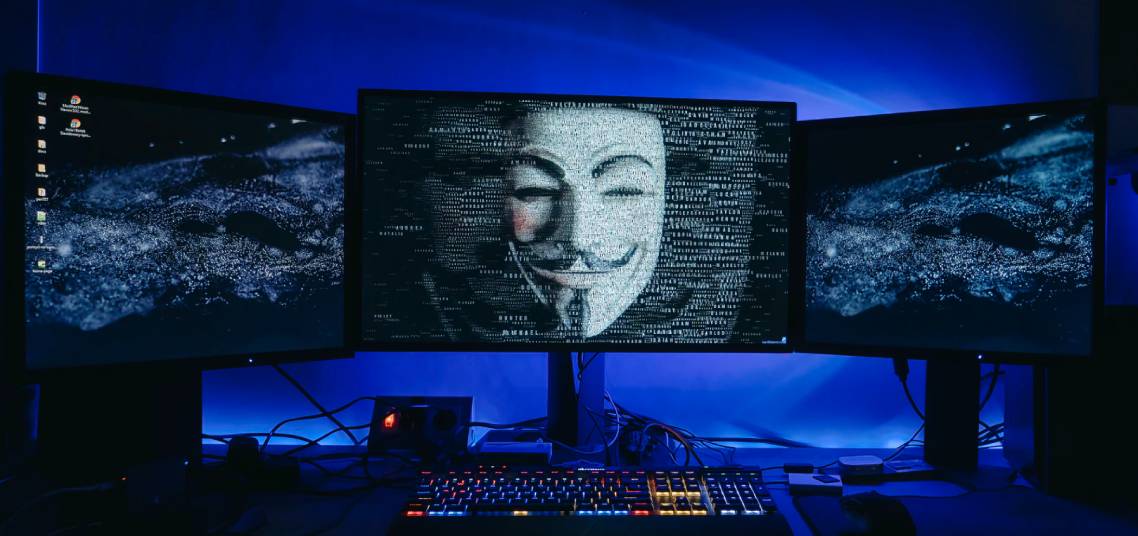Operation Russia: Anonymous goes to cyber war against Russia
2022-03-16
The global discontent following Putin’s invasion of Ukraine has erupted in waves of protests in cities across the world, and has led major organisations, sports leagues, businesses and governments to cut ties with Russia to condemn its actions.
Adding on to the support for the Ukrainian resistance, on the first day of the Russian invasion, the hacker collective Anonymous took a clear stance, by declaring a cyber war against the Russian government on Twitter. Throughout the following week, the collective used two popular Twitter accounts, @YourAnonNews and @YourAnonOne, to claim responsibility over a number of cyberattacks on Russia.
Neither of these two Twitter accounts, which have over 9 million followers combined, have been confirmed as being the group’s official account, however both seem to fall under the umbrella of social media accounts affiliated to Anonymous.
#OpRussia
As promised, Anonymous started launching cyberattacks under Operation Russia, targeting Russian governments’ websites, banks, broadcasting networks, and news outlets. The state-controlled TV network Russia Today (RT), known to spread Russian propaganda, confirmed that its website was made inaccessible for part of the 24th and 25th February. This was as a result of a large DDoS (Distributed Denial-of-Service) attack, found to originate from over 100 million devices, many of which were based in the US. Anonymous also appeared to be the actor responsible for the hack on the Russian news outlets Tass, Izvestia and Kommersant, whose websites were made to display an anti-Putin message and a call to end the war.
Anonymous also mobilised people via its Twitter account, suggesting they inform Russian people of the reality of Ukraine’s invasion in online reviews on the Google maps pages of restaurants and businesses based in Russia. This strategy was devised as a way to counter the misinformation and censorship techniques that Russia uses on its population to control information on the war.
Numerous Russian state TV channels were also hacked by the collective, who started broadcasting patriotic songs, pro-Ukraine content, and true images of the situation in Ukraine.
Anonymous claimed to have launched over 1,500 cyberattacks in just 72 hours, including DDoS attacks on Russian and Belarusian government agencies, in particular on the websites of the Kremlin and the Ministry of Defence. The collective also claimed to have accessed the Ministry of Defence database, and to have taken offline the website of the Russian state-owned company Gazprom.
Anonymous appeared to be responsible for breaching over 200 GB worth of emails belonging to Tetraedr, a Belarusian weapon manufacturer which, according to the collective, offered Putin logistical support for the invasion of Ukraine.
In a video directed to Putin, Anonymous denounced the actions of the Russian president stating that “the ongoing invasion of Ukraine has shown that your regime has no respect for human rights or the self determination of your neighbours”. The hacktivist collective proceeded to inform president Putin that the cyber operation launched against Russia is at its beginning, and “soon you will feel the full wrath of the world’s hackers”.
Anonymous: the infamous hacktivist collective
The decentralised, anonymous and leaderless nature of the hacktivist collective makes it difficult to attribute attacks to the group – any hacker could launch an attack and claim to work under the Anonymous banner. During the cyber war against Russia, a Twitter account linked to Anonymous had to denounce fake claims made by accounts that pretended to speak and act on behalf of the collective. Confirming whether Anonymous was responsible for the over 1,500 attacks it claimed to have launched is even more difficult as the targets will be reluctant to publish technical data related to the attack. However, a website that inspects server outages was able to confirm that numerous websites that Anonymous claimed to have hacked did actually go offline for a period of time.
With simple but disruptive attacks, like DDoS and website defacement, Anonymous seeks to keep the Russian IT apparatus busy, to prevent the country from launching destructive attacks on Ukraine or Western countries. The aim is also to bypass censorship restrictions, allowing the Russian population to be informed on the reality of the war.
Anonymous said it is also working to keep Ukrainian people connected to the internet.
Anonymous has gained worldwide notoriety for its leading role in hacktivism, understood as the use of computer technology to exercise civil disobedience, make a statement on social or political matters, and eventually encourage change. In particular, the hacktivist collective is known for its efforts in combatting censorship and government oppression, and in promoting privacy, freedom of speech and of information.
In the past, Anonymous has carried out attacks against the Chinese government, to protest the oppression of Chinese citizens, and against Israeli websites, following the Israeli military operation in the Gaza Strip. The collective has also launched cyberattacks to support protestors in the Arab Spring uprising, and has targeted ISIS and the Church of Scientology, which it accused of repressing freedom of information.
Anonymous is not the only hacker group to have taken a side in the Russia-Ukraine war. The Belarusian decentralised hacktivist collective Cyber Partisans, known for launching cyber attacks against the Belarusian government, is also using its capabilities in support of Ukraine.
The hacker group Conti instead, announced its full support for Russia, threatening to launch retaliatory cyberattacks against Western countries if Russia is targeted.
Will Russia use its cyber warfare capabilities?
Against all expectations, Russia has not launched devastating cyberattacks against Ukraine’s infrastructure, or in response to Anonymous’ actions.
On the morning of 24th February, the websites for Ukraine’s defence, interior and foreign ministries appeared to be unresponsive following DDoS attacks. On the same day a new strain of destructive computer-disabling malware was found in Ukraine, and was suspected to be part of Russia’s offensive campaign.
Experts agreed that Russia was expected to launch numerous destructive and disruptive cyber attacks against Ukraine, to go alongside the military campaign. It appears however, that cyberattacks are not a vital component of Russia’s strategy at the moment, although this could soon change.
The Ukrainian government in the meantime, has asked volunteers to join an IT army to help keep Ukraine’s critical infrastructure safe, and to help spy on Russian military.
The information contained in this article is provided by White Blue Ocean, part of CRIF Group, a global company specializing in credit & business information systems, analytics, outsourcing and processing services, as well as advanced digital solutions for business development and open banking.
Reference List:
- https://www.abc.net.au/news/science/2022-02-25/hacker-collective-anonymous-declares-cyber-war-against-russia/100861160
- https://www.cnbc.com/2022/03/01/how-is-anonymous-attacking-russia-disabling-and-hacking-websites-.html
- https://edition.cnn.com/2022/03/02/media/rt-propaganda-network/index.html
- https://www.euronews.com/next/2022/02/28/ukraine-war-what-part-is-hackers-collective-anonymous-playing-in-the-war-effort-against-ru
- https://www.euronews.com/next/2022/02/26/ukraine-war-ukrainians-announce-the-launch-of-an-it-army-to-fight-off-russian-cyberattacks
- https://www.independent.co.uk/tech/anonymous-russia-hackers-ukraine-message-b2024989.html
- https://www.independent.co.uk/news/world/europe/cyberattack-ukraine-war-russia-websites-b2022139.html
- https://www.techradar.com/news/anonymous-launches-cyber-war-against-russia
- https://www.theguardian.com/world/2022/feb/27/anonymous-the-hacker-collective-that-has-declared-cyberwar-on-russia
- https://www.theguardian.com/world/2022/feb/24/russia-unleashed-data-wiper-virus-on-ukraine-say-cyber-experts
- https://tribune.com.pk/story/2345664/websites-of-major-russian-news-outlets-hacked
- https://www.standard.co.uk/news/world/who-anonymous-hacker-group-a4456151.html
- https://www.vice.com/en/article/akvy7j/russia-today-suggests-anonymous-took-down-its-site
- https://www.washingtontimes.com/news/2022/feb/25/anonymous-hacking-group-waging-cyberwar-against-ru/
The information contained in this article is provided for informational purposes only and does not constitute professional advice and is not guaranteed to be accurate, complete, reliable, current or error-free.

Related news

Italian convenience giant CONAD hit by Lynx ransomware
2025-02-07Italian retail chain CONAD was hit by the Lynx ransomware group on November 2024. Despite the breach, CONAD's immediate defensive measures successfully protected customer data. The article investigates on the tactics of Lynx, a Ransomware-As-A-Service group, and provides insights on how businesses can strengthen their cybersecurity defences.
Read more
Quishing – Phishing just got an upgrade
2024-01-12QR codes have become very popular in recent years and can be used for many purposes. Cybercriminals exploit them to lure users into sharing a variety of personal information such as credentials and financial data. As the number of quishing attacks continues to grow, it is important to know how to protect.
Read more
DDOS Attacks Rock The Italian Financial Sector
2025-02-21The Russian-based NoName057 group has targeted Italy's financial infrastructure with DDOS attacks, affecting banks and other critical organizations. These attacks are linked to Italy's support for Ukraine. The attacks highlight the need for businesses to implement real-time monitoring and advanced security measures to protect their infrastructure.
Read more
The Risks of IoT in Commerce and Industry
2024-06-17IoT adoption is expanding across all industries, but there are several risks associated with IoT. In this article we explain how to mitigate risks and protect businesses from cyberattacks exploiting these new vulnerabilities.
Read more
When hacking is good: ethical hackers
2022-06-06While talking about the ethics of hackers, the term hacker often has a negative connotation. In reality, a hacker is an extremely competent person in the IT sector who exploits his knowledge, skills and his own curiosity for helping others in order to discover the vulnerabilities of a system.
Read moreContacts
Let's talk
Please fill in the form below (fields with * are mandatory) and we will respond to your request as soon as possible!